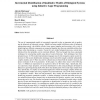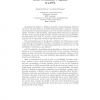33 search results - page 5 / 7 » The Treatment of Negation in Logic Programs for Representing... |
JMLR
2008
13 years 7 months ago
2008
The use of computational models is increasingly expected to play an important role in predicting the behaviour of biological systems. Models are being sought at different scales o...
PSSE
2004
Springer
14 years 22 days ago
2004
Springer
“demonic” nondeterminism, representing abstraction from (or ignorance of) which of two program fragments will be executed. By introducing probabilistic nondeterminism into GCL,...
ENTCS
2002
13 years 7 months ago
2002
In this paper, we develop the notion of fuzzy unification and incorporate it into a novel fuzzy argumentation framework for extended logic programming. We make the following contri...
PLPV
2009
ACM
14 years 4 months ago
2009
ACM
This paper is part of a line of work on using the logical techniques of polarity and focusing to design a dependent programming language, with particular emphasis on programming w...
AMAI
2006
Springer
13 years 7 months ago
2006
Springer
In this work, we introduce a new framework able to deal with a reasoning that is at the same time non monotonic and uncertain. In order to take into account a certainty level assoc...


